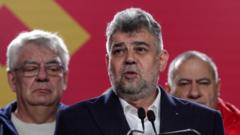The newly elected chancellor faces pressing economic and security issues while attempting to reshape Germany's role in Europe.
Germany's Political Landscape Shifts as Friedrich Merz Takes Office

Germany's Political Landscape Shifts as Friedrich Merz Takes Office
Friedrich Merz's ascension marks a pivotal change in Germany's governance amid significant national challenges.
Germany’s political arena is undergoing a significant transformation as Friedrich Merz of the Christian Democratic Union (C.D.U.) prepares to take the oath of office as chancellor. This transition comes in the wake of a chaotic six-month period following the collapse of Olaf Scholz’s three-party coalition government. Merz, who led the C.D.U. to a first-place finish with 28.5 percent of the vote, will be stepping into the role after a quick negotiation phase with the incumbent Social Democrats (S.P.D.), who managed to secure just 16.5 percent.
Although Merz, at the age of 69, has not previously held a government position and took a notable hiatus from politics after being overlooked for leadership by Angela Merkel, he is known for his compelling oratory and aims to re-establish Germany's prominence in European affairs. However, his incoming administration is confronted with daunting challenges.
As Germany navigates its most precarious circumstances since reunification, the nation faces a sluggish economy exacerbated by international tensions. The fallout from President Trump's tariffs and decreasing demand from China for German exports, particularly luxury vehicles, pose pivotal threats. Additionally, the ongoing energy crisis, driven by sanctions on Russian gas, contributes to soaring energy costs and higher labor expenses, coupled with deteriorating public infrastructure.
In this precarious environment, the new government must also contend with the possibility of diminishing American security support, an aspect that had previously enabled Germany to maintain lower defense investments prior to Russia's aggressive actions in Ukraine. As Merz assumes office, the eyes of both domestic and international observers are fixed on how his leadership will address these critical issues moving forward.
Although Merz, at the age of 69, has not previously held a government position and took a notable hiatus from politics after being overlooked for leadership by Angela Merkel, he is known for his compelling oratory and aims to re-establish Germany's prominence in European affairs. However, his incoming administration is confronted with daunting challenges.
As Germany navigates its most precarious circumstances since reunification, the nation faces a sluggish economy exacerbated by international tensions. The fallout from President Trump's tariffs and decreasing demand from China for German exports, particularly luxury vehicles, pose pivotal threats. Additionally, the ongoing energy crisis, driven by sanctions on Russian gas, contributes to soaring energy costs and higher labor expenses, coupled with deteriorating public infrastructure.
In this precarious environment, the new government must also contend with the possibility of diminishing American security support, an aspect that had previously enabled Germany to maintain lower defense investments prior to Russia's aggressive actions in Ukraine. As Merz assumes office, the eyes of both domestic and international observers are fixed on how his leadership will address these critical issues moving forward.



















